
Earning credits requires absolute sacrifice. As a student in K-12 or college or university, studying for exams can be hectic. Do you think that valedictorians are geniuses? Do you find yourself procrastinating on your assignments? Do you lose focus while your coursework piles up?
If your answer to all these questions is yes, it is about time you invested in a study plan for yourself. Not only will it help keep up with your course, but you’ll also realize that being a top student is all about planning.
You don’t need to give up your hobbies or that extra shift at work. You can do it all. That’s the power of a good study timetable. You get to score As in your exams and keep up with other activities in your life.
Study plan templates are the easiest way to create a student planner. If you are doing common subjects, you can be sure to get a template you can use. This article will show you just how important sticking to a schedule is and how you can leverage templates and samples to elevate your study habits.
The best news yet, you don’t have to do it all alone. You can enlist our help to create the best study planner. We can also provide templates that are personalized based on your needs and specific classes as a college or high school student.
What is a Personal Study Plan?
Are you feeling overwhelmed by textbooks, read lists, assignments, and a never-ending to-do list? Most students find themselves struggling to be productive under pressure. That is where a student planner comes in.
Unlike a regular study schedule, a personal study plan will consider your academic strengths and weaknesses, your learning style, and any other commitments in your life. Think of it as your vision board for your academic life.
Since the end goal is to excel in school, a study plan will outline clear learning goals, break down your coursework into manageable tasks and study strategies, and allocate time for effective study sessions. It is like having a personal coach; it will help you stay focused, organized, and motivated.
Learning How to Learn: Develop Good Study Habits
Imagine passing your exams, getting your degree or diploma, and enjoying the learning process. Is that not the dream for any student? It can be a reality for you, but only if you practice good study habits to keep on the right track in your class. In case you are wondering where to start, worry not, we have the technique down to a T.
First, you need to curate your environment into a study zone. We are a product of our environment. Finding a good place to study that is quiet, comfortable, and distraction-free is crucial. Be it a cozy corner at the school library, a park bench, or your study desk, the space should be conducive for you to focus and concentrate.
It is the 21st century; of course, our phones are our best friends. However, during a study session, phones are a major distraction. That constant ping of notifications will pull you away from valuable learning time. Consider temporarily blocking social media apps, keeping your phone silent, or leaving it in a different room altogether.
Do you find the stark contrast of blank ink against white paper boring? This is for you. We all learn differently. As a visual learner, you would prefer diagrams and flashcards to plain notes. If you are an auditory learner, you learn better by listening to lectures and/or instructional videos. Alternatively, you could be a kinesthetic learner who needs to be active as you learn and thus prefer practical lessons to theoretical concepts.
Before you sit down for a study session, make sure you have all your study materials with you. Whether that is your textbooks, notes, or online resources, they help you understand what you are studying. Having everything within reach saves you time.
If you are trying to retain knowledge, then passive reading is not ideal. You need to actively engage with your coursework. Try taking notes by summarizing and mapping out key points. Go over the same sections at intervals to improve retention. Do not forget to test yourself with sample questions or past exams. Remember, practice makes perfect.
You can enhance your learning experience by choosing the right study planner for you. It is all about personal preference and convenience. Do you feel like digital planners are more flexible and accessible to you? Or maybe you prefer the feeling of paper as you plan your schedule. Is a template more convenient or are you more of a DIY student and need it personalized? Pick one that suits you.
Why Do You Need a Study Plan to Be a Successful Student?
In today’s economic climate, students often find themselves stretching themselves too thin. Between trying to make a buck and balancing their fast-paced academic workload, it can be exhausting, both physically and mentally.
However, it can be helpful to have an efficient study plan in place. It’s a roadmap to academic success. Having a study schedule in place will help you prioritize challenging course material and stay on top of your coursework, leading to improved grades.
Being a student can feel like a full-time job at times. But it doesn’t have to be. You can manage time, but only if you track it right with a student planner. By being aware of how you spend the given hours in a day, you can set priorities, schedule study sessions better, and avoid last-minute creaming. This way, you get more time to do things you enjoy.
Do you always get that sinking feeling as an assignment deadline or test looms? Is procrastination the thorn in your side academically? A study plan will help you stay focused, allowing you enough time to research and deliver well-written assignments. Say yes to being a productivity powerhouse.
But how do you craft the perfect study plan? We’re not here to just help with tough homework problems (though we do that too), we are a valuable resource to create a well-organized study plan.
How Do You Make a Study Plan? Tips for Creating a Study Plan
Whether you are in high school or college, having an effective study plan is a staple. You can easily manage your schedule, to allow you time for family and extracurricular activities. Here is a practical and comprehensive guide that students can use when creating a study plan that meets their needs.
Evaluate Your Study Habits and Learning Style
Before you start ironing out your schedule, the first step is to assess your study habits and understand how you prefer to learn. You can ask yourself, “How do I prefer to learn? Am I a visual, auditory, or kinesthetic learner? Do I have habits that hinder my studying”?
Beyond your learning style, what study methods have worked well before? Do you cram, or take notes while listening to lectures? Are you a night owl or an early bird? The answers to these queries will help you tailor your study schedule.
Consider Your Other Commitments
Here is the big question, how can you accomplish the goals you’ve set in your work and personal life, while also being academically successful?
Before you plan your study sessions, assess your current schedule. Do you have family, work, or extracurricular activities? How will your social engagements impact your study schedule?
High school students need to balance academics, extracurricular, and their social life. College students need to manage their shifts at work and have a healthy routine.
Plan Your Study Time for Each Class
Have a list of all your classes, assignments, exams, and deadlines. Estimate how much time you would need for each class and task by evaluating how difficult and complex the coursework is.
Develop an Effective Study Schedule
To have a schedule that works for you, you need to prioritize like a pro. Classify your tasks as either important or urgent. This will determine how much time you will set aside for each.
Break down your study time into hourly, daily, and weekly plans. Weekly goals plan out all your tasks, while daily schedules are for urgent assignments and tests. Hourly blocks help you track time spent on specific topics.
Plan Your Break
Rest is not a luxury; it is a necessity to avoid burnout. For effective time management, consider the Pomodoro Technique. It preaches the practice of breaking your study sessions into 25-minute focus periods, followed by five-minute breaks. After 4 intervals, schedule time for a longer break.
You can take short breaks to hydrate and grab a snack or go for a short walk during the longer break time.
Why Do You Need a Study Plan Template?
A study plan template outlines the most important elements that you need to consider when creating a study plan. You can have different variations of planners, each serving a different purpose.
Daily Study Planner
It allocates how much time you would spend studying in a single day.
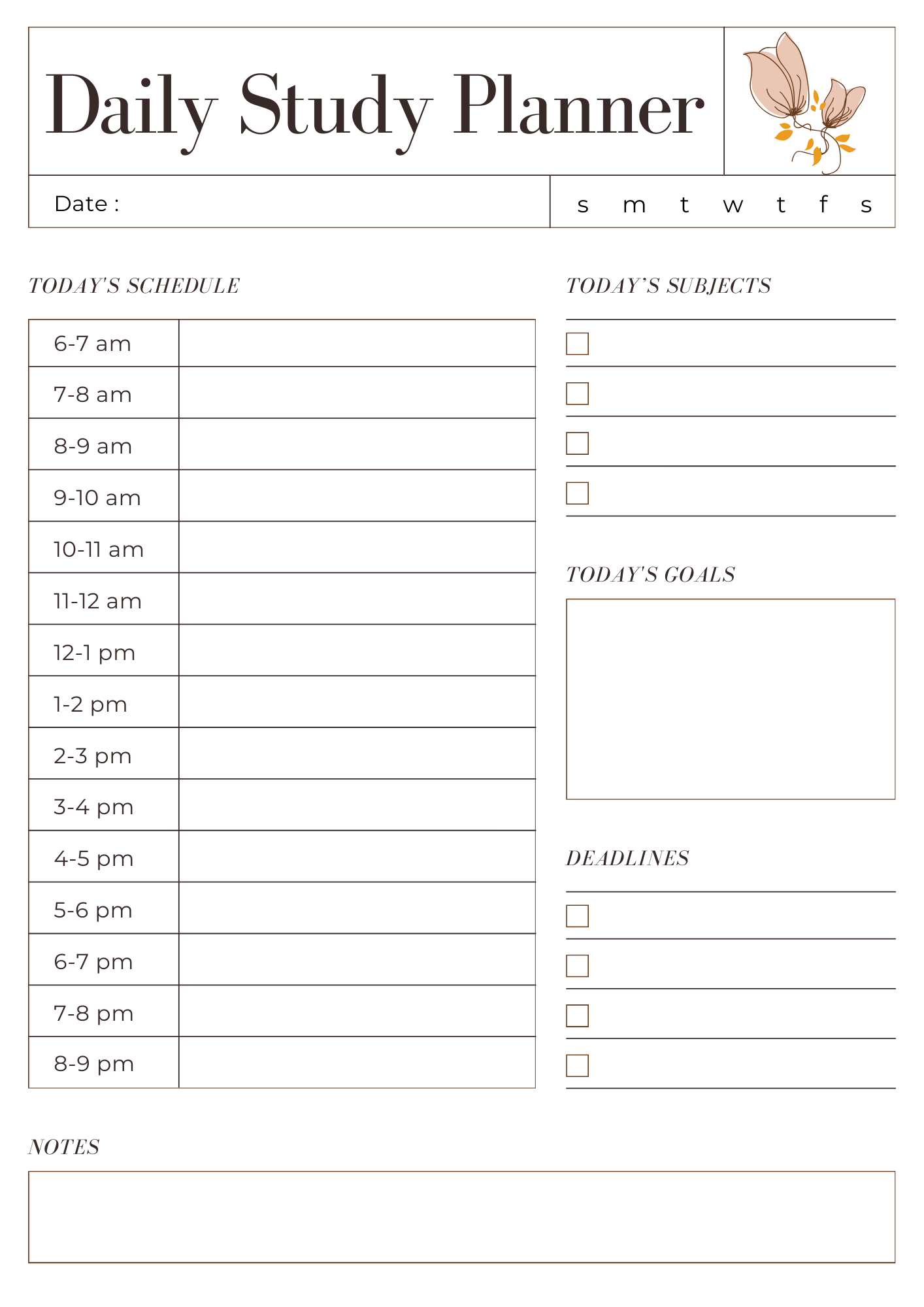
Homework Planner
Keep track of your assignments by keeping a planner dedicated to your homework.
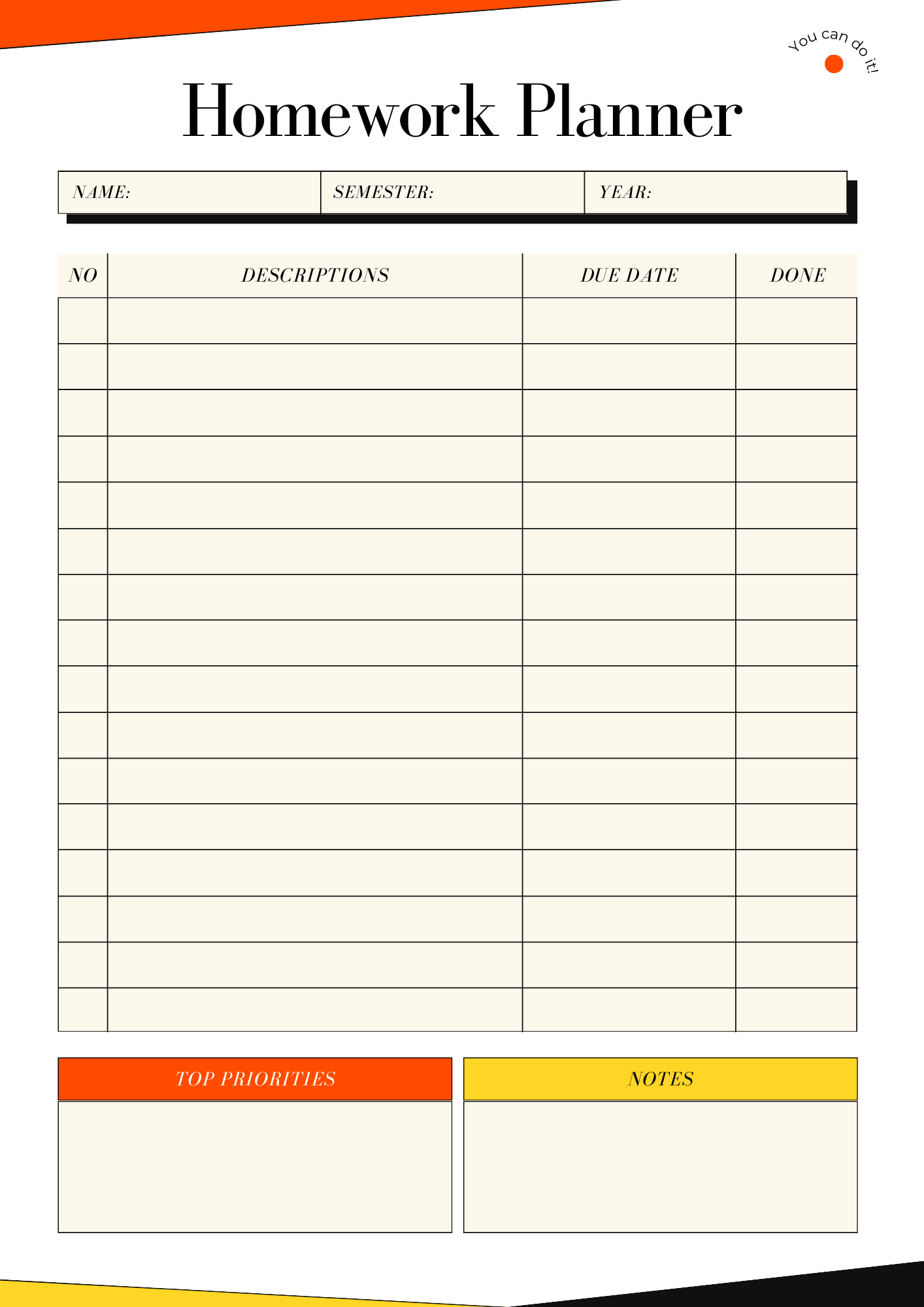
Weekly Study Plan Template Example
You need to be able to get a glance at how much schoolwork you need to complete each week.
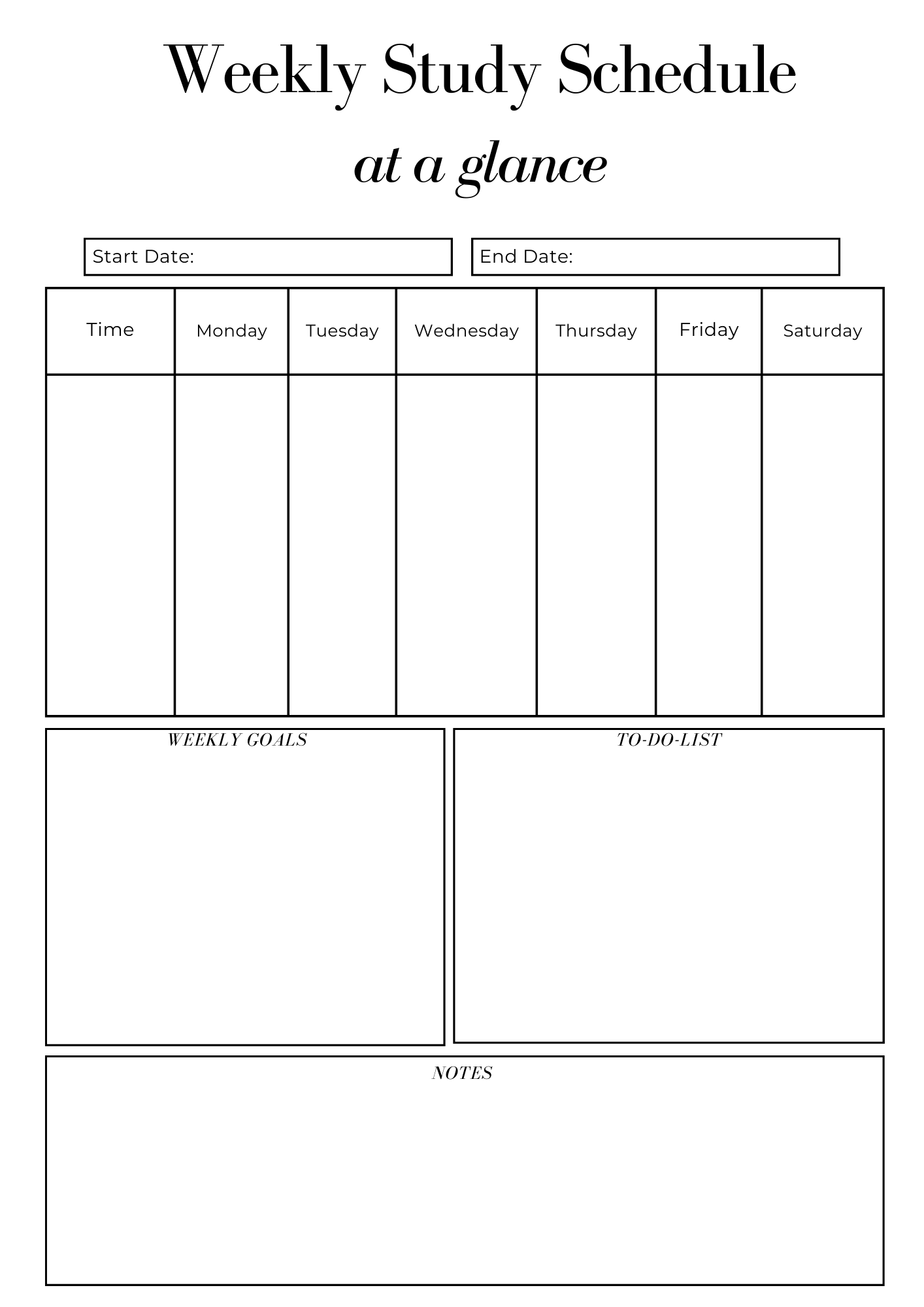
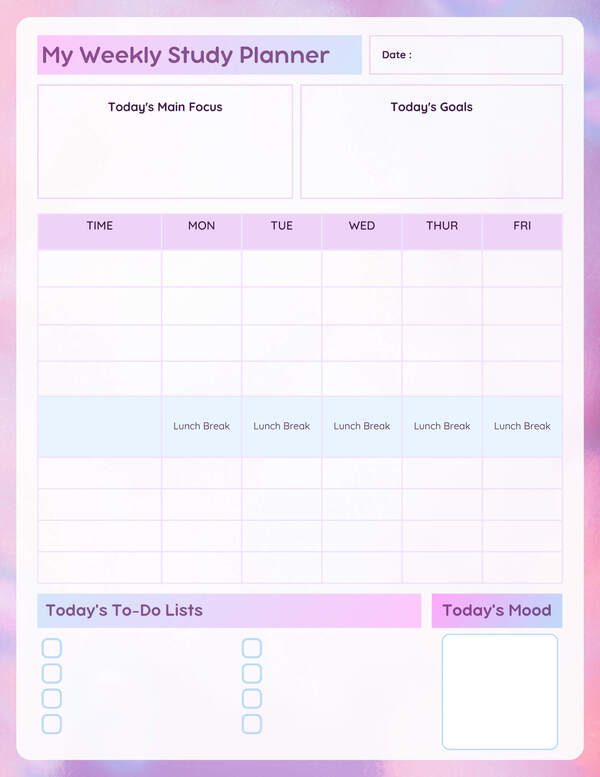
Exam Preparation Planner
The best way to pass your exams is to be prepared. Different exams need different studying strategies.
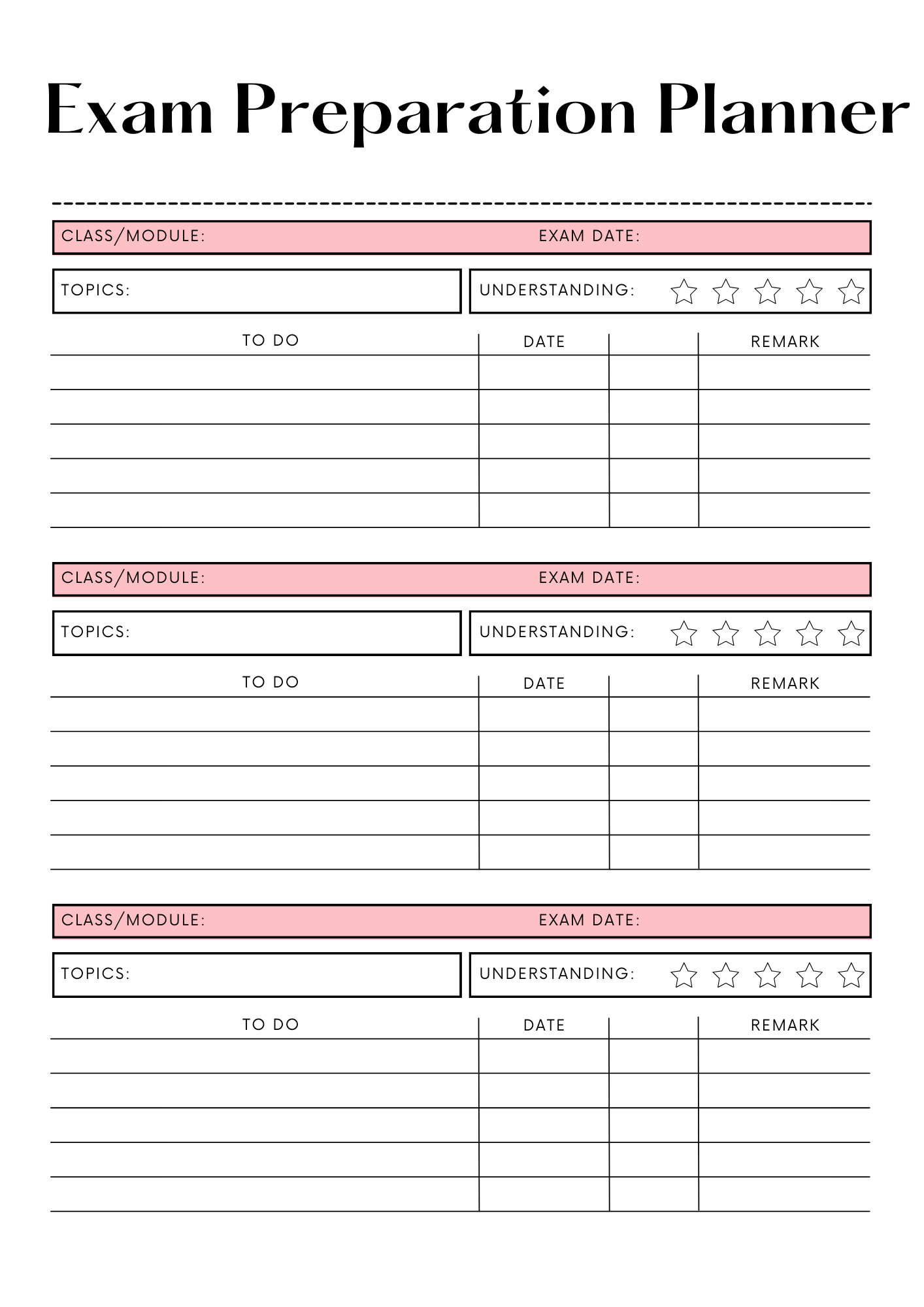
Long-Term Study Planner Template for a Semester
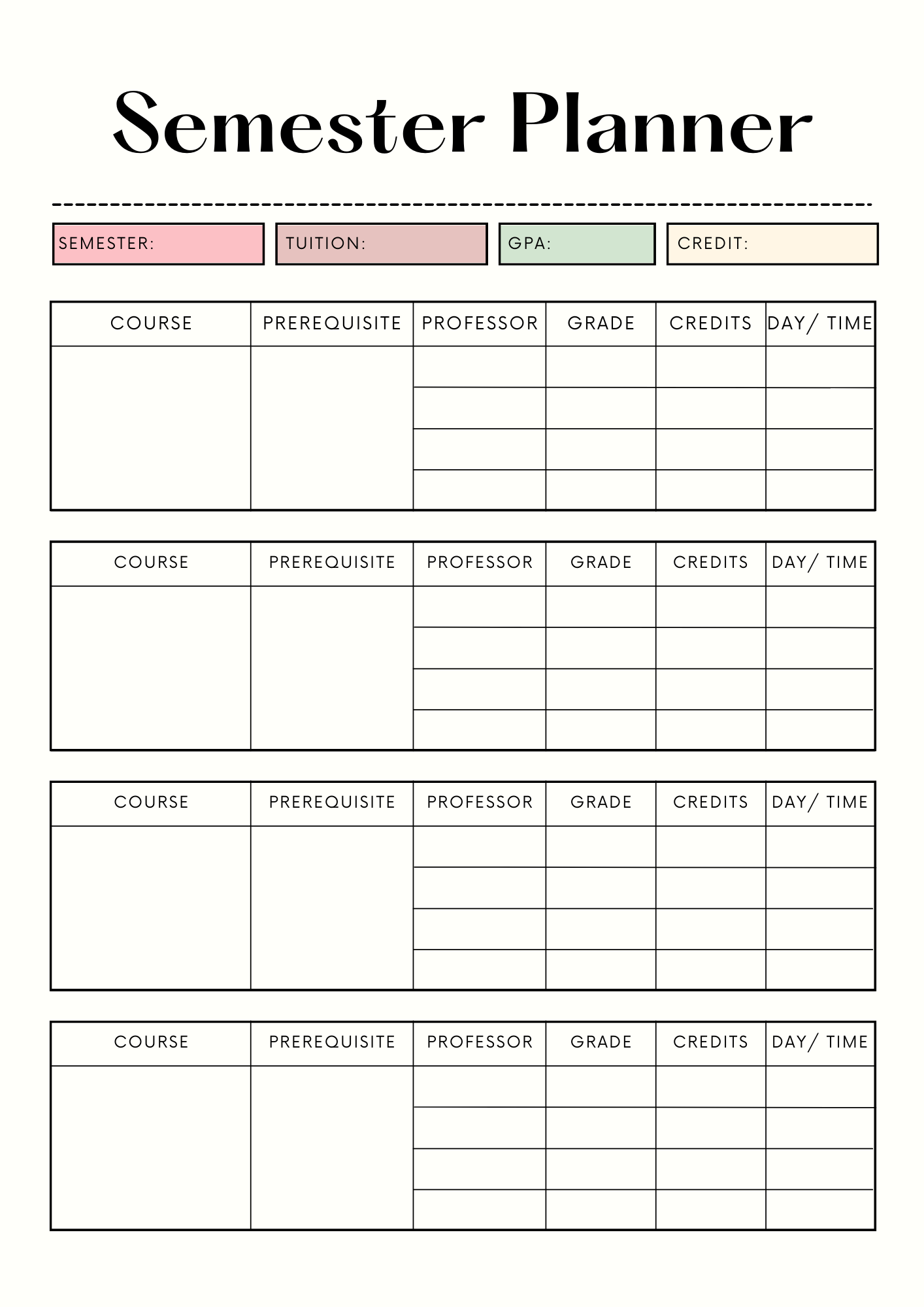
How to Stick to Your Study Plan for Improved Academic Performance?
Now that you’ve got the ingredients to create a perfect study plan, sticking to the schedule is a whole other undertaking. You can easily get swept away by the hustle and bustle of every day. Despite your good intentions, your social engagements can take away time from studying. Here are some helpful strategies:
Accountability: Find a Study Buddy or Group
A study group or buddy doesn’t just offer support and motivation, you can share learning resources and celebrate milestones together. Other students will also explain concepts in a much easier language than your lecturer.
Make Study Time Part of Your Routine
Just like brushing your teeth, you should integrate study sessions into your daily routine. Set reminders every week to ensure you spend enough time studying. This helps you with consistency and self-discipline when it comes to your academics.
Time management apps and tools
New technology is always coming up. You can leverage apps and calendars to set constant reminders and track your progress. There are add-ons you can use to block distracting websites, ensuring you have minimal distractions.
Reward Yourself
You cannot wait till graduation to celebrate your milestones. Instead, treat yourself to a small reward every time you achieve a goal. Take yourself out for a movie after passing that Algebra quiz. A reward system is the best motivation.
Assess and Adjust Your Study Plan
Your study plan is a living document, adapt and adjust. After several weeks, assess how effective your schedule is, based on academic performance. If a technique is not working, change it. Remember, there is no progress without change.
Set Realistic Goals
Setting unrealistic goals will lead to disappointment. By having realistic goals, you get to celebrate small wins, like mastering a complex concept. As long as you are making progress, you will see that most of your academic goals can be met.
Can I get Help Setting up my Study Plan?
Absolutely yes, there’s strength in numbers. You can enlist the help of our expert tutors and educators. This article is just a tip of the wealth of knowledge we have when it comes to scheduling your studies. There’s never a one-size-fits-all study plan.
Let us help you research and determine what goals you need to set to excel in your class. We can collaborate with you to develop the most effective tool for academic success. The best study plan for you is one click away!


